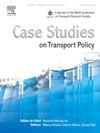Factors affecting the daily travel frequency of low-income residents in the Tunisian Sahel region: An analysis with Geographically Weighted Regression
IF 3.3
Q3 TRANSPORTATION
引用次数: 0
Abstract
Although global interest in transport equity is rising, research on low-income populations’ urban mobility remains overwhelmingly biased toward developed nations. In the Global South, such studies are still limited and mainly address public transport and infrastructure deficiencies. This paper seeks to fill this knowledge gap by examining the main factors influencing daily trip frequency of low-income individuals in Tunisia, accounting for both socio-economic conditions and spatial heterogeneity in mobility. The work aims to contribute to the discourse on the mobility among low-income individuals and the design of shape pro-poor transport policies in comparable contexts. The study was conducted in the Tunisian Sahel region, and data from 1,191 low-income individuals were collected through a household survey administered, in 2019, to all 40 delegations in the region. We first developed a Poisson Regression to gain initial insights into the relation between trip frequency and a combination of various factors across the study area. Next, we used a Geographically Weighted Regression to examine the complexity of its local variations. The results revealed a wide range of factors influencing the mobility of low-income Sahelians, as well as significant spatial variability among the 40 delegations of the region. The daily trips frequency of this demographic seems to be determined by a combination of their socio-demographic and household characteristics, their mobility features, and their perceptions of the particulars of the available transportation options determined by their perceptions. Our findings provided actionable multi-level insights and visual evidence to shape inclusive transport policies in the Tunisian Sahel region.
影响突尼斯萨赫勒地区低收入居民日常出行频率的因素:地理加权回归分析
尽管全球对交通公平的兴趣正在上升,但对低收入人口城市交通的研究仍然压倒性地偏向于发达国家。在全球南方,这类研究仍然有限,主要针对公共交通和基础设施的不足。本文试图通过研究影响突尼斯低收入个人日常出行频率的主要因素来填补这一知识空白,同时考虑到社会经济条件和流动性的空间异质性。这项工作旨在促进关于低收入个人流动性的讨论,并在可比背景下设计有利于穷人的交通政策。该研究是在突尼斯萨赫勒地区进行的,通过2019年对该地区所有40个代表团进行的家庭调查,收集了1191名低收入个人的数据。我们首先开发了泊松回归,以初步了解出行频率与研究区域内各种因素组合之间的关系。接下来,我们使用地理加权回归来检查其局部变化的复杂性。结果揭示了影响低收入萨赫勒人流动的各种因素,以及该地区40个代表团之间的显著空间差异。这一人口的日常出行频率似乎是由他们的社会人口和家庭特征、他们的流动性特征以及他们对由他们的看法决定的可用交通选择的细节的看法共同决定的。我们的研究结果为突尼斯萨赫勒地区制定包容性交通政策提供了可操作的多层次见解和直观证据。
本文章由计算机程序翻译,如有差异,请以英文原文为准。
求助全文
约1分钟内获得全文
求助全文

 求助内容:
求助内容: 应助结果提醒方式:
应助结果提醒方式:


